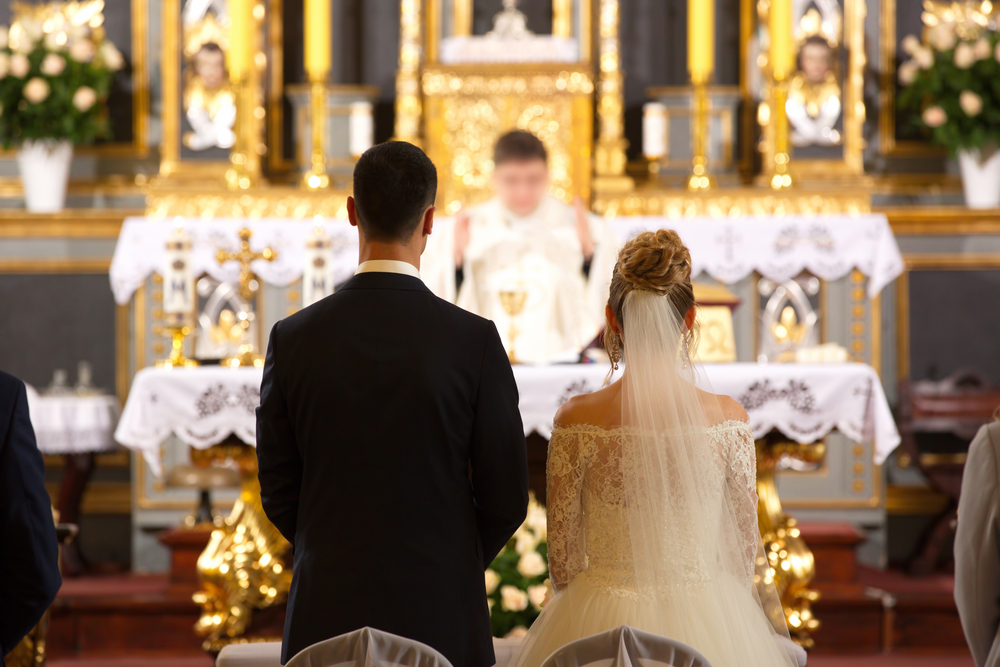Life Stages: Marriage
In present-day Mexico, marriage is a grand occasion for joy and celebration. Most men and women, however, opt for common-law unions and cohabitation—widely recognized in the society—rather than legal marriages.
The legal age for marriage in Mexico is 18. Boys aged 16 and girls aged 14 can marry with their parents’ permission. The median age for a first marriage is 26 for women and 29 for men. Family hierarchy is an important factor in arranged marriages. Conservative traditional families consider it an obligation to marry off the older child of the family before the marriage of his or her younger siblings.
Catholic Traditions
Mexican marriages are conducted according to civil law as well as Catholic tradition. The engagement and marriage are initiated and “sponsored” by the godparents, or padrinos, of the couple. They provide the wedding rings for the couple along with gifts like gold coins to symbolize financial stability. During the marriage vows, padrinos wrap a silken cord, white ribbon, or rosary called a lasso around the necks of the couple. This is considered a sign of lifelong unity, devotion, and commitment. It is also customary for the newlyweds to receive a Bible, often embossed with their names and the date of their marriage.
A Mexican bride typically wears her mother’s or grandmother’s wedding dress as a status symbol and out of respect to her family legacy. The traditional wedding gift from groom to bride is thirteen gold coins, which he presents to her one at a time. Catholic wedding rituals include a church Mass, prayers near the altar and blessings by the priest, the exchange of rings, and the tossing of red beads or rice at the church entrance to mark good luck. Wedding celebrations typically include music, romantic dancing and salsa, games, lots of food, many guests, and a grand reception. At the reception, all guests customarily join hands to form a heart shape around the newlyweds while they do their “first dance” as husband and wife. The wedding reception concludes with the traditional piñata and a rum-soaked wedding cake.
Elopement or “stealing” the woman is also common in cases where parents disapprove of their daughter’s chosen partner. The couple usually spends a night together, which obligates the parents to accept the relationship and arrange for their formal union. Ironically, couples may establish their own home, live together for some years, have a few children, and then plan for marriage.
Post-Wedding Practices
Newlyweds live in the husband’s parents’ home and move to their own separate households after a few years. The cultural expectations of marriage in Mexico mainly include the couple’s obligation to form a new separate household and produce children. Women are responsible for bearing children, raising them, and performing household responsibilities.
Although parents do arrange marriages, especially among rural and traditional families, young Mexicans have the freedom to choose their life partners and legally have equal rights after they are married. Cohabitation and live-in relationships are also on the rise in contemporary Mexico, leading to a decrease in formal marriages.
Extramarital affairs are culturally not accepted, although infidelity certainly exists. Tiny minorities of married people are involved in “casual” love affairs, especially in case of long absences of spouses caused by their migration from home.
Mexican couples can initiate divorces on various grounds, including cruel treatment, infertility, or simply mutual consent. The laws and courts display a higher degree of favoritism towards men when granting legal separation in cases of adultery or sexual dissatisfaction. Divorced women, however, have the right to retain their share of the marital property. Divorcees are also usually granted maintenance if they are not financially independent. The custody of children can be mutually decided by the couples themselves or it can be granted by judicial decision. The court will consider the wishes of the children if they are old enough.
Same-Sex Marriage
Mexico recognizes same-sex marriage. In 2017, the Mexican Supreme Court ruled that the country's ban on same-sex marriage was unconstitutional. The ruling was based on the principle of equality and the court's determination that denying same-sex couples the right to marry violated their fundamental rights. Since then, same-sex marriage has been legal throughout Mexico and same-sex couples have the same legal rights and protections as opposite-sex couples, including the right to marry and adopt children.
Copyright © 1993—2024 World Trade Press. All rights reserved.

 Mexico
Mexico 

